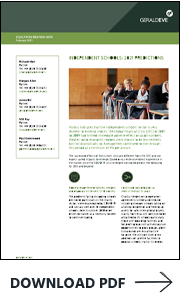Independent schools - 2021 predictions
History indicates that the independent schools’ sector is very resilient to external shocks. The Global Financial Crisis (GFC) of 2007 to 2009 had limited immediate adverse effect on pupil numbers. Weaker socio-economic regions were shown to be less resilient, but not dramatically so. Average fees continued to rise through this period at a minimum of 4% per annum.
The cause and effects of the current crisis are different from the GFC and we expect varied impacts to emerge. Based on our extensive direct experience in the market since the COVID-19 crisis emerged we would predict the following for 2021 and beyond:
Above average level of failures, mergers and disposals in the next 12-18 months
The problems facing struggling schools pre-Covid, particularly in the charity sector, were exacerbated by COVID-19 and we saw well over 10 independent schools close in summer 2020 or be driven to market as a necessity to seek to continue trading.
Continued consolidation as seen in the last 15 years
Charity mergers or co-operation agreements will be a contributor including stronger schools taking on a failing competitor and freeing up assets for sale; international buyers, mainly from Asia, will continue to be attracted to UK schools particularly those with boarding facilities; and for-profit groups will actively pursue opportunities to grow groups, albeit turnarounds are less attractive to some. We will continue to see additions of satellite facilities to popular schools, mainly in London.
No material decline in values in the prime market to-date
There was an initial pause for breath on a few sales of operating schools at the start of the pandemic, but we expect to see a few complete shortly, broadly in line with pre-COVID profit multiples (i.e. no discounts applied). Similarly, on behalf of clients we have bought and sold prime school property investments and vacant possession premises since March 2020 – at top-end pricing. However, across all of these, opportunities are few and the buyer market is limited and therefore, less certain than previously.
Encouraging level of demand in the secondary and tertiary markets to continue
Counter-intuitively, the sector has not previously experienced such distress and at the same time, we have not seen so many prospective purchasers. That said, the predictability of pricing is less certain and delivery risks have increased. Our recent experience of international buyers, generally involving failing or failed schools, have indicated that underlying property values have held up reasonably well, but some buyers are unreliable and availability of funding is very difficult to diligence.
Established schools groups will continue to have appetite to acquire schools with good growth potential in stronger socio-economic areas
We have recently received five competitive bids to acquire a trading charity school, which is a good indicator of ongoing demand from credible buyers.
Stable demand but considerable challenges around affordability of fees
Market activity would appear to indicate that operators foresee a reasonably stable demand for independent schooling, which in part will result from: a) localised improvements in supply and demand characteristics (i.e. where school closures take place) and, b) as new parents are attracted to the independent sector by the demonstrably superior education offering delivered throughout the recent lockdowns. On the other hand, the challenge of the affordability of fees whilst running sustainable businesses in a competitive environment will remain.
Appealing sector to investors
Investors will continue to be attracted to this needs based sector and away from more volatile sectors which are seeing greater structural change. The characteristics of the sector are such that investors see opportunities in being able to purchase long-term cash flows, generated by a school’s business, secured on good and often freehold properties. In addition, economies can be achieved through growing groups of schools, particularly in geographical clusters.
Asset quality and underlying property values will be key
These factors will retain an important influence on valuation multiples and the pricing of turnaround opportunities. Although there are currently more factors which are negative to pricing looking forward, we think that investor demand and the good potential for sale and leaseback and ground rent transactions will hold up values reasonably well.
Related Service and Sectors
Cookie Policy
Privacy Overview
| Cookie | Duration | Description |
|---|---|---|
| cookielawinfo-checkbox-analytics | 11 months | This cookie is set by GDPR Cookie Consent plugin. The cookie is used to store the user consent for the cookies in the category "Analytics". |
| cookielawinfo-checkbox-functional | 11 months | The cookie is set by GDPR cookie consent to record the user consent for the cookies in the category "Functional". |
| cookielawinfo-checkbox-necessary | 11 months | This cookie is set by GDPR Cookie Consent plugin. The cookies is used to store the user consent for the cookies in the category "Necessary". |
| cookielawinfo-checkbox-others | 11 months | This cookie is set by GDPR Cookie Consent plugin. The cookie is used to store the user consent for the cookies in the category "Other. |
| cookielawinfo-checkbox-performance | 11 months | This cookie is set by GDPR Cookie Consent plugin. The cookie is used to store the user consent for the cookies in the category "Performance". |
| viewed_cookie_policy | 11 months | The cookie is set by the GDPR Cookie Consent plugin and is used to store whether or not user has consented to the use of cookies. It does not store any personal data. |
